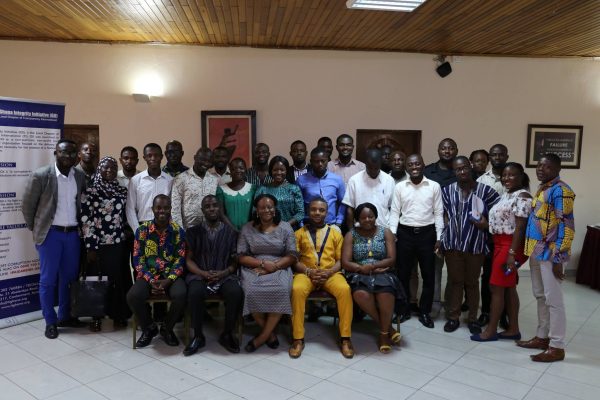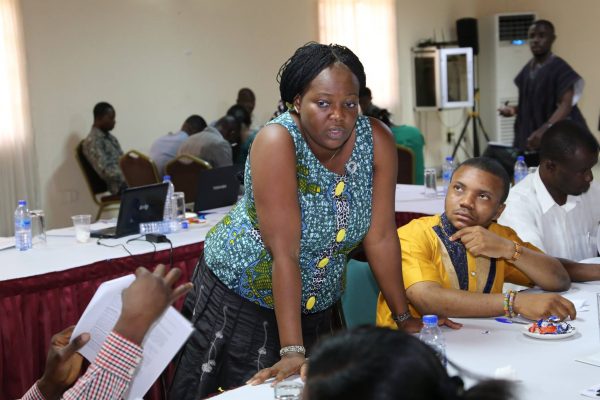 On 5th December 2018, I attended a workshop organised by the Ghana Integrity Initiative (GII) to enhance knowledge and awareness of the Africa Union Convention on Preventing and Combatting Corruption (AUCPCC). The programme brought together 29 civil society and media practitioners who learned and interacted on their role in ensuring that Ghana meets its obligations in relation to the AUCPCC.
On 5th December 2018, I attended a workshop organised by the Ghana Integrity Initiative (GII) to enhance knowledge and awareness of the Africa Union Convention on Preventing and Combatting Corruption (AUCPCC). The programme brought together 29 civil society and media practitioners who learned and interacted on their role in ensuring that Ghana meets its obligations in relation to the AUCPCC.
The workshop was facilitated by the Director of Anti-Corruption at the Commission for Human Rights and Administrative Justice (CHRAJ), Charles Ayamdoo, who presented Ghana’s effort in fighting corruption and the level of implementation of anti-corruption commitments under the AUCPCC.
The AUCPCC is a shared roadmap for states to implement anti-corruption systems and good governance on a regional or national level. The convention contains strong provisions that could help in resolving corruption challenges in Ghana. However, beyond its ratification in 2007, Ghana has not regularly reported progress on implementation.
Moreover, the facilitator presented some research findings on the extent to which Ghana has discharged her obligations under the AUCPCC, with a focus on money laundering, illicit enrichment, political funding, civil society and media, access to information, code of conduct and assets declaration.
Evaluation of Ghana’s compliance with the anti-corruption convention of the AU
- Money Laundering: The research findings revealed that Ghana is in full compliance with Article 6 of the AUCPCC. Since 2007, the Anti-Money Laundering Act criminalises money laundering and has gone further to establish the Financial Intelligence Centre (FIC) to assist in the implementation of the Act, something not provided for by article 6 of the AUCPCC.
- Illicit enrichment: the existing legislative and measures show that conflict or interest and illicit enrichment have not yet been established as offences.
- Funding of Political Parties: The Ghana Political Parties Act 2000 (Act 574), do not cater for the activities of political party candidates in Parliamentary elections. There is no transparency nor limit on campaign financing. Therefore, the country is not fully complying with Article 10 of the AUCPCC.
- CSO and Media: Article 12 of the AU Convention recognises the role of civil society and the media in curbing corruption, but that provision is yet to be practicalised in Ghana. For instance, a short pre-training evaluation revealed that many CSO and media practitioners were more aware of the United Nation Convention Against Corruption than the African Union Convention on Corruption. Also, the non-compliance of article 12 is demonstrated by the non-representation of CSOs on the AU Advisory Board on Corruption and the non-representation of CSOs in delegations of country visits by the Board.
- Assets declaration and code of conduct: The existing legislation on assets declaration regime is deficient in many areas. Reform is required in order for Ghana to maximise the benefits of a robust and strong assets declaration regime.
- Access to information: Since 2009, the Right To Information (RTI) Bill is still pending. Despite the recent advocacy actions from civil society it is still difficult to predict when it shall be enacted. Therefore, the country is not in full compliance with Article 9 of the AUCPCC.
After Mr. Charles Ayamdoo presented these key findings on Ghana’s obligation towards the AUCPCC, the participants were asked to mingle and constitute two main groups with the goal of identifying key priority areas for advocacy and elaborate some recommendations.

Key priority for advocacy and recommendations
The key priority areas that have been identified are access to information, CSO and Media, illicit enrichment and political party funding. Regarding civil society and media, it has been recommended that:
- More and better civil society advocacy is needed to enhance effective engagement of stakeholders and the government on the implementation of the AUCPCC.
- CSOs should prepare their own reports on monitoring activities of the Board for the consideration of the AU Commission
- CSOs should hold government accountable and responsible for ensuring the implementation of the AUCPCC and also request for feedback on the reporting obligations as well as challenges Government may be encountering;
- CSOs need to lobby for representation on the Board and collaborate more closely with relevant key state institutions on the AU Convention.
At the end of the program, CSO and media practitioners have commended the current government for implementing measures and strategies, including the creation of the Office of the Special Prosecutor to support the fight against corruption. But the reality is that corruption remains consistent and persists despite these efforts.
We strongly believe that the Government should move from slogans to actions. It, therefore, requires a stronger leadership, oversight institutions and financial support to help strengthen existing anti-corruption systems and support civil society in eradicating corruption. We also need to reorient our attitudes and perceptions as citizens and not spectators. Fighting corruption is a collective responsibility and everyone must contribute with his own quota. We need to eschew politicisation of corruption and encourage citizens to reject and run-away from this canker wherever they are.
